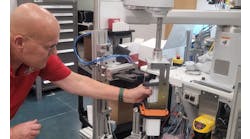Members of the Business Roundtable are changing their tune
When I was in middle school in the mid-1960s, my science teacher stood up in his pleated pants, white socks and Hush Puppies, and took a full class session to explain how it would be impossible for a human being to travel to the moon. I guess because we were too young to understand escape velocity, he focused on the distance and compared its 238,000 miles to the readings on our parents’ car odometers. How could we hope anyone would ride in a single machine more than twice the distance a car could conceivably last, carrying everything they would need for the journey including air to breathe? Obviously, not possible.
My father had been a pilot in World War II and my mother was a chemist, and neither doubted the inevitable, eventual success of the Apollo mission, but I’m sure our science teacher was not alone in his convictions.
When in due time I attended the University of Chicago (on what turned out to be a futile mission to become a physicist), I learned that great, gray, Gothic bastion of classical science and liberal arts harbored a shiny building where the economist Milton Friedman brewed and dispensed the Chicago School of economic principles. In a great oversimplification, you could credit the Chicago School with replacing managerialism (where corporations are managed to meet the manager’s goals) with neoliberalism (where everything is driven by the free market).
Friedman is not famous for saying “Greed is good,” but he did say, “Of course, none of us are greedy, it’s only the other fellow who’s greedy.” And what he promoted in the 1970s became the foundation for the profit-centered corporate management style of today, driven by quarterly results, shareholder value and personal gain at the cost of anything that gets in the way, including the environment, society and the welfare of the working class. For a small and decreasing percentage of the population, Friedman’s strategies have been very successful. For the rest of us, not so much.
Now, apparently CEOs have noticed their sad standing in society, the stressed world they draw on for materials and markets, and the disdain of the young talent they rely on for future profits, and are changing their tune. Or at least, they’re talking about it.
On August 19, 181 members of the Business Roundtable, an association of CEOs “to promote a thriving U.S. economy and expanded opportunity for all Americans through sound public policy,” claimed to move away from the concept that corporations exist to serve shareholders, a principle the group has endorsed since 1997. Among its members are many process industry companies including Alliant Energy, Eastman Chemical, International Paper, Duke Energy, Southern Company, Bechtel, Fluor, Honeywell, Rockwell and Siemens.
“The American dream is alive, but fraying,” said Jamie Dimon, chairman and CEO of JPMorgan Chase & Co. and Chairman of Business Roundtable. “Major employers are investing in their workers and communities because they know it is the only way to be successful over the long term. These modernized principles reflect the business community’s unwavering commitment to continue to push for an economy that serves all Americans.”
The statement says corporations should focus on delivering value to customers and investing in employees by compensating them fairly, providing important benefits, supporting them through education and training, and fostering diversity, inclusion, dignity and respect. They should deal fairly and ethically with suppliers, and support communities by respecting people, protecting the environment and embracing sustainable practices.
Finally, they should generate long-term value for shareholders, “who provide the capital that allows companies to invest, grow and innovate. We are committed to transparency and effective engagement with shareholders,” the statement says. “Americans deserve an economy that allows each person to succeed through hard work and creativity and to lead a life of meaning and dignity. We believe the free-market system is the best means of generating good jobs, a strong and sustainable economy, innovation, a healthy environment and economic opportunity for all.”
Before you join the chorus that sees this as something between lip service and a load of crap, remember—we made it to the moon.
Latest from Asset Management

Leaders relevant to this article:




